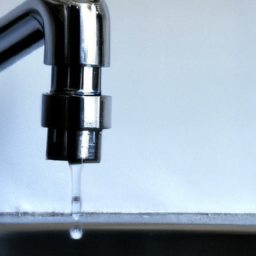If you’re looking to improve the quality of your tap water, you may be wondering whether an under sink water filter or a faucet filter is the better option. Both of these devices are designed to remove impurities and contaminants from your water, but they have some key differences. A faucet filter is a compact and convenient device that attaches directly to your water faucet, offering an accessible way to filter out particles, chlorine, heavy metals, and other potentially harmful substances. On the other hand, an under sink water filter is installed beneath your sink and provides a more comprehensive filtration system. While it requires more installation effort, it offers a larger filtration capacity and can remove a wider range of impurities. So, which one is right for you? Let’s explore the pros and cons of each to help you make an informed decision. When it comes to choosing a water filtration system for your home, two popular options are an under sink water filter and a faucet filter. Both types of filters are designed to improve the quality of your tap water by removing impurities and contaminants, but they have some key differences. In this article, we will compare the two options in terms of size and installation, filtration capability, filter lifespan, water flow rate, maintenance and replacement, cost, aesthetics, water pressure, and versatility. By the end of this article, you will have a better understanding of which option is best suited for your needs.
Size and Installation
Starting with size and installation, the under sink water filter is a larger system that requires more space under your sink for installation. It typically consists of multiple stages of filtration, including pre-filtration, carbon filtration, and post-filtration, which contribute to its larger size. The installation process for an under sink water filter can be more complex, as it involves connecting the filter to your existing plumbing system and installing a separate faucet for filtered water.
On the other hand, a faucet filter is a compact and convenient device that attaches directly to your standard water faucet. It is much smaller in size compared to an under sink water filter and does not require any additional space under your sink. The installation process for a faucet filter is relatively simple and can be done without the need for any special tools or professional help.
Filtration Capability
In terms of filtration capability, both under sink water filters and faucet filters are effective at removing impurities and contaminants from your tap water. However, the under sink water filter tends to offer a higher level of filtration due to its multi-stage filtration process. It can effectively remove particles, chlorine, heavy metals, sediment, and other potentially harmful substances from your water, resulting in cleaner and better-tasting water.
A faucet filter, on the other hand, typically uses a combination of activated carbon and other filtration methods to remove impurities from your water. While it may not offer the same level of filtration as an under sink water filter, it is still capable of removing particles, chlorine, and odors, making your water safer and more pleasant to drink.
Filter Lifespan
When it comes to filter lifespan, the under sink water filter generally has a longer lifespan compared to a faucet filter. The filters in under sink water filters typically last anywhere from 6 months to 1 year, depending on the usage and water quality. This means that you will need to replace the filter less frequently, saving you time and money in the long run.
On the other hand, a faucet filter usually has a shorter lifespan, typically ranging from 2 to 6 months. This means that you will need to replace the filter more frequently, which can be a bit of a hassle and an added expense. However, some faucet filters come with a filter life indicator that lets you know when it’s time to replace the filter, making the process more convenient.
Water Flow Rate
Water flow rate is an important factor to consider when choosing a filtration system, as it determines how quickly the water will flow through the filter. In general, under sink water filters tend to have a higher water flow rate compared to faucet filters. This means that you can enjoy a steady and strong flow of filtered water from your separate faucet without any noticeable decrease in water pressure.
On the other hand, a faucet filter may have a slightly lower water flow rate compared to an under sink water filter, especially if your water pressure is already low. While this may not be a major issue for most people, it could be a consideration if you value a strong and consistent flow of water.
Maintenance and Replacement
When it comes to maintenance and replacement, both under sink water filters and faucet filters require some level of maintenance. However, the level of maintenance needed for each type of filter can vary.
For an under sink water filter, regular maintenance involves replacing the filter cartridges and sanitizing the system every 6 to 12 months, depending on the usage and water quality. This process may require some basic plumbing knowledge and the use of special tools. However, many under sink water filter systems come with clear instructions and are designed to be user-friendly, making the maintenance process relatively simple.
On the other hand, a faucet filter is generally easier to maintain. Most faucet filters come with a simple twist-on design that allows for easy filter replacement. You will typically need to replace the filter cartridge every 2 to 6 months, depending on the usage and water quality. Some faucet filters also come with a filter life indicator or a notification system that alerts you when it’s time to replace the filter.
Cost
Cost is an important consideration when choosing a water filtration system. In general, faucet filters are more affordable compared to under sink water filters. The upfront cost of a faucet filter is relatively low, and the replacement filters are also generally more cost-effective. This makes a faucet filter a budget-friendly option for those looking for a simple and affordable way to improve the quality of their tap water.
On the other hand, under sink water filters tend to have a higher upfront cost. The initial investment for an under sink water filter can be higher due to the larger size and more complex installation process. Additionally, the replacement filters for under sink water filters may also be more expensive compared to faucet filters. However, it’s important to consider the long-term cost savings of an under sink water filter, as its filters typically have a longer lifespan, resulting in fewer replacements over time.
Aesthetics
The aesthetics of a water filtration system can be an important factor for some individuals. An under sink water filter is installed out of sight, under your sink, which means it won’t interfere with the overall aesthetics of your kitchen. The only visible component is the separate faucet, which can be a simple and sleek design that matches your existing kitchen fixtures.
On the other hand, a faucet filter is installed directly on your water faucet, which means it will be visible in your kitchen. While most faucet filters have a compact and unobtrusive design, some people may find them less aesthetically pleasing compared to an under sink water filter. However, it’s worth noting that there are now faucet filter models available in various designs and finishes, allowing you to choose one that matches your kitchen decor.
Water Pressure
Water pressure is another important consideration when choosing a water filtration system. In general, both under sink water filters and faucet filters should not significantly affect the water pressure in your home. However, there may be some minor differences depending on the specific model and your existing water pressure.
An under sink water filter is typically installed with a separate faucet for filtered water. This means that the water pressure from the separate faucet will not be affected by the filter, allowing for a consistent flow of water. However, if the water pressure in your home is already low, you may experience a slight decrease in water pressure when using the separate faucet.
A faucet filter is directly attached to your water faucet, which means that the water pressure from your faucet may be slightly affected. However, most faucet filters are designed to maintain a reasonable water flow rate without significantly impacting the water pressure.
Versatility
Lastly, let’s consider the versatility of under sink water filters and faucet filters. An under sink water filter is a versatile option as it can be used for multiple purposes, such as filtering water for drinking, cooking, and other household activities. It provides a dedicated faucet for filtered water, allowing you to easily access clean and safe water whenever you need it.
A faucet filter, on the other hand, is primarily designed for filtering water for drinking purposes. While it can still be used for other household activities, such as washing fruits and vegetables, it may not be as convenient or efficient as an under sink water filter. Additionally, some faucet filters may not be compatible with certain types of faucets, so it’s important to check the compatibility before making a purchase.
Conclusion
In conclusion, both under sink water filters and faucet filters have their own advantages and disadvantages. The size and installation, filtration capability, filter lifespan, water flow rate, maintenance and replacement, cost, aesthetics, water pressure, and versatility vary between the two options. When choosing between an under sink water filter and a faucet filter, it’s important to consider your specific needs, budget, and preferences.
If you have more space under your sink, are looking for a higher level of filtration, and don’t mind a slightly more complex installation process, an under sink water filter may be the better choice for you. On the other hand, if you have limited space, are on a tight budget, and prefer a convenient and easy-to-install option, a faucet filter may be the ideal solution.
Ultimately, the most important thing is to choose a water filtration system that suits your needs and provides you with clean, safe, and great-tasting water. Whether you choose an under sink water filter or a faucet filter, both options can significantly improve the quality of your tap water and contribute to your overall health and well-being.

